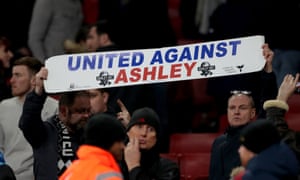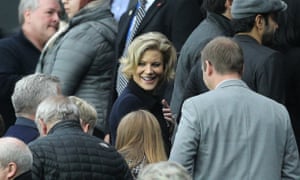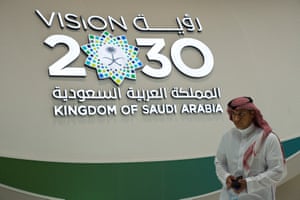[ad_1]
Will they or won’t they? Is he going to stick or twist? Where do fantasy and reality collide?
These questions have been asked about Newcastle United’s owner, Mike Ashley, and the club’s potential Saudi Arabian takeover for some months now. A deal finally appears to be materialising, but similar uncertainties hover over virtually all club buy-outs.
Every takeover is, in many ways, a cross between a high-stakes game of snakes and ladders and a glorified house purchase. Think Location, Location, Location on steroids but without Kirstie Allsop’s and Phil Spencer’s commonsense choreography.
Many pencilled-in purchases collapse at one of the five broad steps that need surmounting before an agreement can be reached. This week Newcastle have reached stage five, further than any other takeover attempted in the 13 years of Ashley’s ownership.
Scene one: initial contact and expression of interest
Self explanatory and broadly comparable to a favourable first view of a house for sale.
Scene two: initial due diligence, the NDA, and exclusivity
A vital phase which, depending on the club’s size, can cost around £1m in lawyers’ and forensic accountants’ fees as bank balances, details of on-going legal disputes, future financial liabilities, existing debts, personnel contracts, commercial deals and tax arrangements are combed through. Non-disclosure agreements typically kick in early on and ensure enduring, binding, confidentiality to guard against the leakage of possibly damaging information. Only a tight, pre-agreed, circle of individuals are privy to information about the sale. Although not mandatory, exclusivity clauses provide a legal guarantee that no rival buyer can negotiate simultaneously to buy the club – football’s solution to gazumping.

Scene three: the data room
Perhaps disappointingly, the data room is not a physical space inside an underground bunker but a heavily encrypted website with restricted access. It enables the seller’s lawyers and accountants to analyse confidential documents such as HMRC’s ongoing “Operation Loom” investigation into certain historic transfers at Newcastle over a number of weeks and, sometimes, months.
By the time the data room is opened, “heads of terms” should also be being drafted. This is a relatively succinct document detailing key facts, including the identity of potential vendors and purchasers, the ballpark price and a rough timeframe for any deal.
Scene four: the Sales Purchase Agreement
It often takes months rather than weeks to reach this point, namely the production of a lengthy legal document – thicker than some novels – replete with strict conditions and exclusion clauses. Crucially, the SPA also reveals the specific purchase price, payment method and timeframe for exchange of ownership. Before its signature paperwork from both parties will typically be sent to the Premier League in readiness for the final hurdle.
Scene five: the owners and directors test
The Premier League is generally informed of all potential buy-outs well in advance, with many such deals never coming to fruition. The Dubai-based Bin Zayed Group’s attempt to buy Newcastle, for example, foundered somewhere around scene four last summer. Once a move gains traction, league officials seek to meet prospective new owners, examine blueprints and confirm funds to buy and run a club for the foreseeable future really are in place.
Significantly, potential geo-political ramifications of controversial foreign takeovers are assessed and inquiries made into the true source of funding. The actual owners and directors test – or the fit and proper persons test – embraces narrower parameters.
There are seven reasons why it is failed, prospective purchasers having previously been: declared bankrupt, barred as company directors, featured on the sex offenders’ register, imprisoned for a crime involving dishonesty, holding a 10% stake in another Premier League club, involved in a club declared insolvent, suspended by another sports body or breached betting rules. Completion can take a month.

Newcastle’s situation
All this often happens amid the utmost discretion, with Abu Dhabi’s purchase of Manchester City the prime example. Occasionally, though, leaks occur and sketchy details of Newcastle’s mooted sale to a consortium fronted by the Yorkshire-born financier Amanda Staveley and involving the billionaire Reuben brothers and Saudi Arabia’s Public Investment Fund (PIF) started trickling out in January.
Nothing is certain but a changing of the guard at St James’ Park is beckoning. Ashley, of course, has been here before with assorted attempts to buy Newcastle – and there have been at least seven – variously foundering due to the purchaser’s lack of funds and, reputedly, the difficulty of dealing with the retail tycoon. Ashley has traditionally preferred buying to selling businesses but, with his high street empire under coronavirus-induced pressure, he is keen to leave Newcastle.
Saudi Arabia’s PIF has, counter-intuitively, responded to the pandemic by initiating a spending spree, buying up assorted businesses – including a stake in Carnival, a cruise line – whose future had appeared clouded by the emergency. It is all part of the Kingdom’s Vision 2030, a project designed to modernise Saudi Arabia, weaning it off its traditional dependence on oil revenues.

Meanwhile Reuben Brothers – one of Britain’s richest families – own a lot of property on Tyneside including Newcastle’s racecourse and never denied their involvement in the so called “Project Zebra”.
If, Reuben Brothers, Staveley and PIF – one of the world’s wealthiest sovereign wealth funds – seem unlikely bedfellows, the thinking might be that the presence of such diverse partners could soften the inevitably awkward questions about “sports washing” and Saudi Arabia’s human rights record surrounding the Kingdom’s involvement in English football.
When rumours of the takeover first emerged Amnesty were quick to condemn the idea but coronavirus has since altered the economic landscape to such an extent that fewer searching inquiries may be asked of them. And particularly if the new owners execute urban regeneration plans.
All Newcastle fans can do is hope that, post Ashley, the St James’ Park grass really will be greener.
[ad_2]
Source link